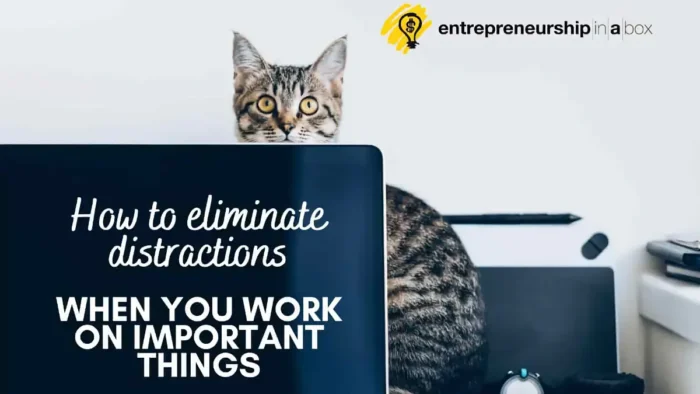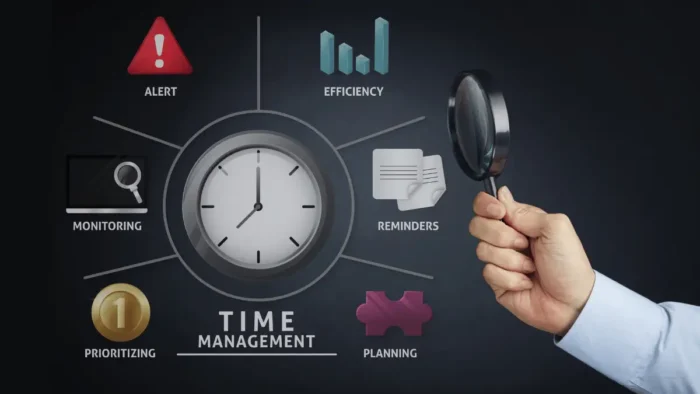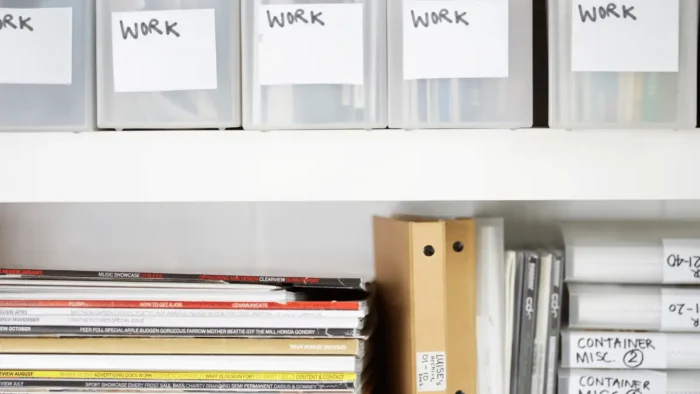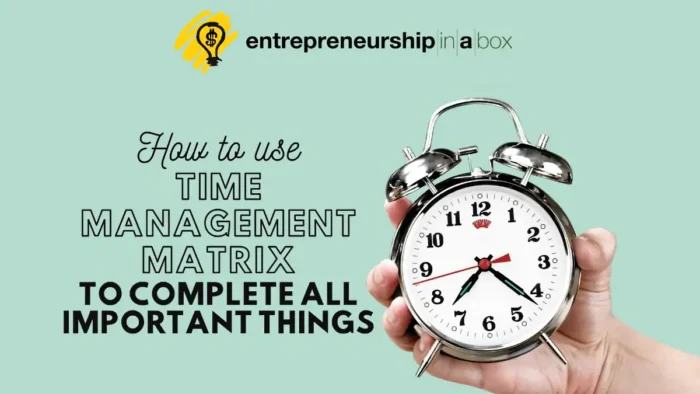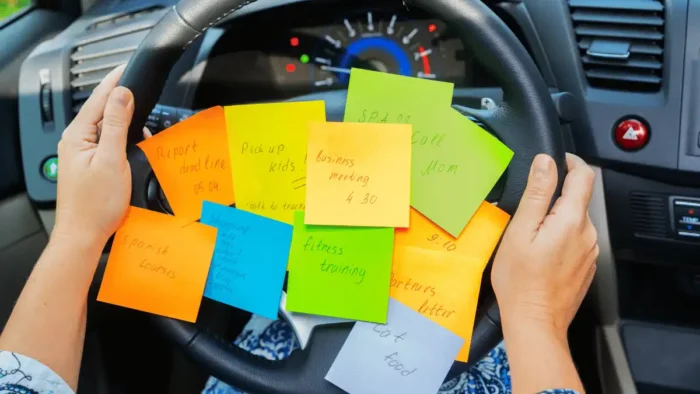When you’re working on an important project at your day job, you must find a way to eliminate distractions that could distract you from your work. Distractions are one of the biggest productivity killers. While you can’t completely eliminate distractions at work, you can take some measures to improve your workplace productivity. You need to work on eliminating distractions when working on important things.
Do you find yourself in a position where you start working on something important for you or your business, and you stop with the work because your colleague comes and asks you something in your office? You will probably hear the newly received message via email or messenger. Or you find something interesting online and start reading instead of working.
Someone else priority is not your priority. You have your priorities.
When we live in a distraction-based environment with so many gadgets, the most critical question is how to transform our environment to eliminate workplace distractions.
It’s easy to get distracted when working on important tasks at home or the office. To make sure you stay focused, follow these 14 action steps to keep yourself productive and focused.
Someone else priority is not your priority. You have your priorities.
When we live in a distraction-based environment with so many gadgets, the most critical question is how we can transform our environment to eliminate distractions.
It’s easy to get distracted when working on important tasks at home or the office. To make sure you stay focused, follow these 14 action steps to keep yourself productive and focused.
How do Distractions Affect Productivity?
To understand how to focus better, it’s important first to recognize what distracts us. Distractions can come in many forms, but the most dangerous ones are so common that we often don’t even notice them. For example, the sound of an email arriving, the layout of an open-plan office that encourages colleagues to interrupt each other, or the constant notifications from social media can all disrupt even the most dedicated worker.
Distractions disrupt our focus and flow of doing things and harm our cognitive functions. A study published in Nature highlighted the association between gray matter structure (a region in our brain involved in empathy and cognitive and emotional control) and academic performance among Chinese high school students, suggesting that structural differences in the brain could influence cognitive abilities. Similarly, research featured in ScienceDirect found positive correlations between regional gray matter and creative potential, indicating that distractions affecting gray matter density could potentially lower our IQ and decrease creativity.
These findings emphasize the importance of understanding the negative impacts of distractions on cognitive functions like memory, attention, and IQ and on the physical structure of our brains. These will definitely impact our productivity when we work on important tasks.
A compelling study led by Professor Gloria Mark from the University of California reveals an intriguing finding: it may take over 23 minutes to fully recover our focus after a slightly raised interruption. If you get one interruption when working on important things and work the whole hour, you will use your full potential in only 37 minutes, not 60 minutes.
What is this if it is not a lower level of productivity for yourself and your employees in your company if there are too many distractions at the workplace?
So, if you want to boost productivity on an individual and organizational level, you must find ways to eliminate or minimize as much as possible all workplace distractions that negatively impact productivity.
What are Common Distractions at Work?
So, as you can see, workplace distractions greatly impact today’s productivity. But the question here is, what are the common workplace distractions? Generally, distractions can be broadly categorized into four main groups:
1. Digital Distractions
This category includes digital interruptions from various digital technology sources, such as digital notifications from different tools we use every day. If not managed properly, they can also be a source of distraction.
For example, constant reminders or alerts to complete tasks or check off items on a to-do list, social media posts and their notifications from various social media sites, or email notifications we always get when we receive an email, regardless of their importance, can disrupt our focus, decrease productivity, cause stress, and decrease job satisfaction.
As a digital distraction, cell phones, and personal phone calls ring when we work, and someone else’s priority becomes our own priority. We often don’t pay attention to internet browsing unrelated to work as a possible distraction. For example, if you search the web for specific information, you can easily become a victim of bombarding news, posts, advertisements, etc., which can steal your time and distract you from what is important to you.
2. Interpersonal Distractions
This category includes interruptions from other people in the workplace, such as colleagues, managers, or clients. Distractions can take various forms, such as casual conversations, unscheduled meetings, unproductive meetings, or requests for help or advice.
For example, improvised meetings or discussions can interrupt the workflow, making it difficult to regain focus later. Meetings without a clear agenda or purpose, going off-topic, or running longer than necessary can also significantly distract employees.
Also, interruptions can come from other people, including unplanned visits to your workspace by colleagues who ask you questions regardless of whether they are work-related or not.
While some of these interactions may be necessary and work-related, others can take up much of your time and distract your focus on important tasks.
3. Environmental Distractions
Environmental distractions are workplace distractions that involve factors related to the physical work environment where you do your work.
In this category, office noise, such as conversations among colleagues, phone calls to other workplaces if you work in an open office space, or even the buzz of office equipment like printers, scanners, photocopiers, etc., can distract you and other workers from your responsibilities.
Part of this category is visual distractions, which are also a significant source of interruptions. For example, an open office layout can make blocking out visual distractions like colleagues walking by or cluttered workspaces challenging.
Also, if you are working from home, you may be distracted by family members in your home office. Therefore, you will need to find ways to set boundaries between work and family time.
4. Personal Distractions
Personal distractions are distractions that come from within ourselves. They can be emotional or psychological factors like stress, fatigue, boredom, or hunger.
For example, if you feel stressed about a personal matter while working, focusing on work tasks at your full potential may be challenging. Also, attempting to do multiple tasks simultaneously can lead to decreased attention and productivity for each task.
It is important for you to understand these distraction categories because they can help you and your organization identify all those distractions that need to be managed or minimized, as you can see later when I share some action steps to combat these distractions.
14 Action Steps to Eliminate Workplace Distractions
Now, let’s discuss how you can eliminate workplace distractions on individual and organizational levels.
Let’s start with the individual level because if you, as an entrepreneur, find ways to increase productivity, you can easily replicate some of the action steps on the organizational level to help your employees spend less time on distractions and more time on important work.
#1 Understand Workplace Distractions
First, you must understand what workplace distractions are and what effects they have on your work.
You need to start by understanding your experiences with distractions and knowing exactly how they impact your daily work hours and routine. The goal is to list all possible distractions that bother you while you work on your most important tasks.
After you have completed your own list, you can observe other workplaces inside your company and make a list of organizational distractions at work. Simply, you want to increase workplace productivity while your employees spend less time on distracting activities.
The goal is to have a table with all common distractions at work and what is most important, ask and respond to the questions:
- What is something that distracted me or my employees the most?
- Where does the specific distraction appear?
- When does each of the common distractions appear?
- How is the distraction happening?
- Why does the specific distraction appear?
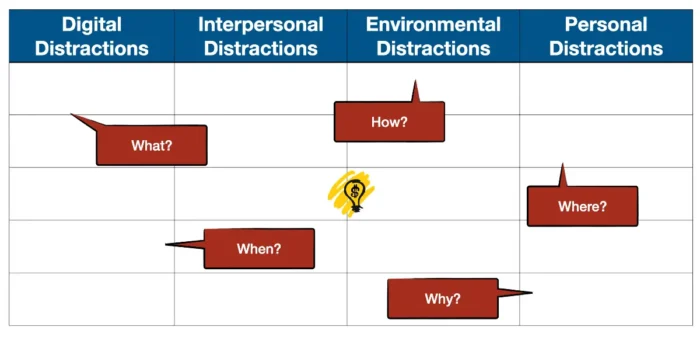
This process will help you locate possible distractions and analyze their impact on workplace productivity. So don’t escape this step because you will not know what to do next. Instead of doing essential things, you will do something that will not help you to increase productivity and grow your small business.
Related: How to Be More Productive at Work in This Messy Business Environment
#2 Use time blocking to eliminate distractions and boost productivity
Time blocking is one of the best weapons or productivity tools for combating distractions at work. This technique requires dividing your day into separate units of time, dedicating each to specific tasks or similar tasks. So, you dedicate a specific time frame for what you will do at that time frame and do only things that are for that block of time.
Cal Newport’s concept of “deep work” illustrates the philosophy behind time blocking. His thesis is straightforward: By dedicating long, uninterrupted blocks of time to focused work, you can achieve cognitive abilities that are all too often limited by today’s modern work life’s distractions.
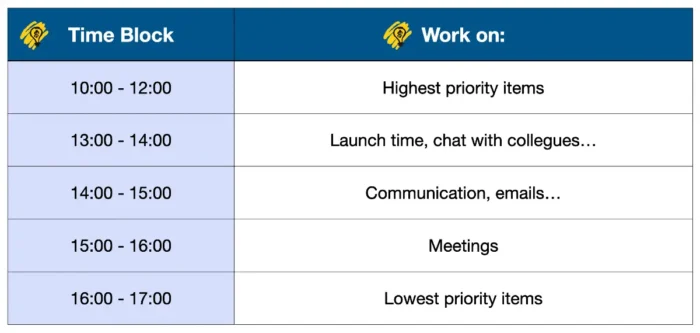
You need to know what you need to work on and when because you won’t be able to start working without it. To-do lists are essential productivity tools. Use them to begin organizing your workday correctly.
Building an effective organizational system will make your employees around you more productive and less distracted.
Sometimes, procrastination is one of the most significant distractions from work and you can follow these five techniques to beat procrastination.
Related: Everything You Need to Know About Effective Use of Your To-Do List
#3 Analyze possible interruptions and build a strategy for eliminating them.
One of the biggest challenges for any business owner, big or small, is dealing with interruptions. While these interruptions can be highly disruptive to a business, they can also be helpful—if we know how to deal with them effectively.
What interruptions do you experience when working on your tasks? This is an essential question to ask in your efforts to eliminate common distractions. Once you know what interrupts you, you can start developing strategies to reduce them.
For example, if you have digital disruption, you can cancel all notifications from your devices for a time you are blocked to work on important things.
Now, you can have an additional table with all common distractions that most impact productivity, strategies to eliminate or minimize them, and a to-do list for implementing each specific strategy.
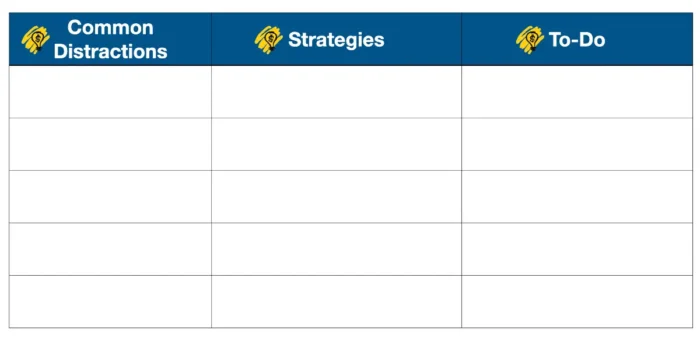
#4 Analyze your own and your team members’ working habits and try to implement different time-saving techniques.
Again, you need to start by analyzing your and your team members’ working habits. How do you do your work? Is it on one computer or two? How much time do you spend using some of the tools required to carry out the work? Can you improve your use of those tools?
I know that productivity often depends on the tools you use daily. Why not try to combine them most productively? If you can save more than half the time doing your current job, you can escape some of the possible distractions at the time. This is simply the probability theory. More time spent finishing work will increase the probability of bringing different distractions.
#5 Start reading when you are on your mobile devices.
Use your cell phone and tablet to go through your daily reading routine. I know that you read magazines, blog RSS feeds, and research readings… but you can read everything everywhere with the help of your mobile devices.
So, why not use them to increase productivity instead of being your biggest distraction?
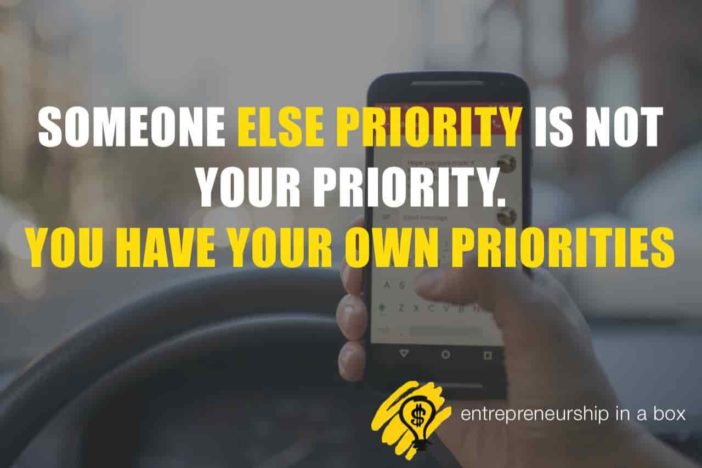
Related: How to Have Multiple Phone Numbers on One Cell Phone: A Step-By-Step Guide
#6 Start using the Pomodoro technique.
Most of us are familiar with the Pomodoro Technique, a popular time management method similar to time blocking that has helped millions of people get more done in less time. The Pomodoro technique helps you stop wasting time on distracting tasks and instead focus on what really matters. The basic idea is simple: for every 25-minute work period, you take a 5-minute break (called a “Pomodoro”). During your break, you can look at email, use social media, and other distractions.
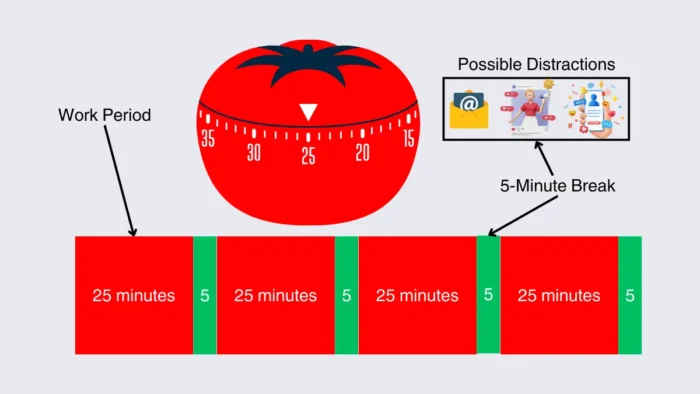
Some people might find this a pain, but using the Pomodoro Technique to your advantage can save you hours each day. It will help you organize your work units and analyze your progress toward completing your to-do list.
#7 Try Marc Andreessen’s anti-to-do list.
You can use anti-to-do lists whenever you do something useful during your work hours, something you are proud of. Write down all your accomplishments in your anti-to-do list. Then, look at your lists and everything you get done that day.
In Marc Andreessen’s mind, the only way to get your priorities straight is to eliminate distractions first. That means eliminating all the distractions that don’t matter in the grand scheme of things.
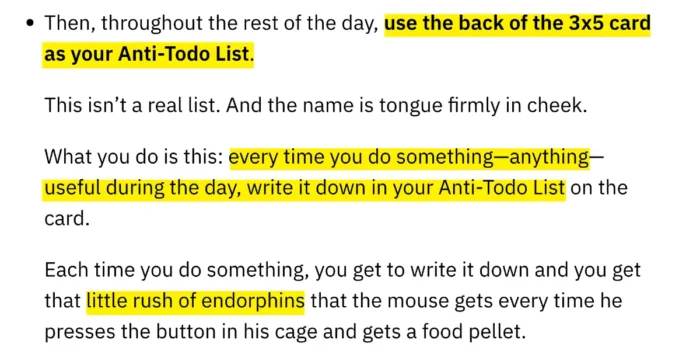
#8 Check your email at a particular allocated time for that job.
This step requires you to make a ritual of checking your email daily for a certain amount of time.
I have personal time at my workplace to check my email each day. If I don’t do this at a specific time, my day gets disorganized. My task manager (currently using OmniFocus) tells me when I need to check my emails. It’s much easier to get stuff done when you know that you have to check your email.
Many studies found that checking email at a specific time each day improves an employee’s performance, both in and outside the office. So, you can easily classify email as one of the biggest distractions. Because of that, allocate part of your time each day to processing your email. In such a way, you will not need to keep your email client open, which is the source of possible distractions.
#9 Turn your cell phones into airplane mode.
This is one of the simplest yet most effective ways to turn off all notifications and stay focused on the work you need to do. Doing this will save time and eliminate the distractions of constant alerts, which can affect your productivity.
The airplane mode means to turn off all wireless connections and services on your cell phone while you work on meeting your most important priorities. This allows you to escape distractions when all those connections and services are active.
In such a way, keeping your phone in airplane mode will eliminate the possibility of accidentally checking emails or social media sites, leading to distractions that cost you valuable time.
#10 Start Using the Rescue Time App to collect information about your productive work.
You must track time to determine what tasks you can eliminate from your day. You can track your time with one of the best productivity tools for me – RescueTime. This allows you to quickly obtain helpful information about how you spend your time and see how you could improve your workflow.
RescueTime will help you make smarter business decisions by giving you access to all the data you need to understand what is working in your workflow. By tracking your work across multiple devices, apps, and programs, RescueTime gives you a snapshot of exactly where you spend your time. As you work on improving your productivity and increasing your business’s revenue, you’ll find that the app offers invaluable insights into how you use your time and how you can stay focused on maximizing your efficiency.
Rescue Time is a tool that measures everything you do on your computer and categorizes your work as productive and unproductive. It allows you to easily see where you spend unproductive time and consider strategies to decrease or avoid it.
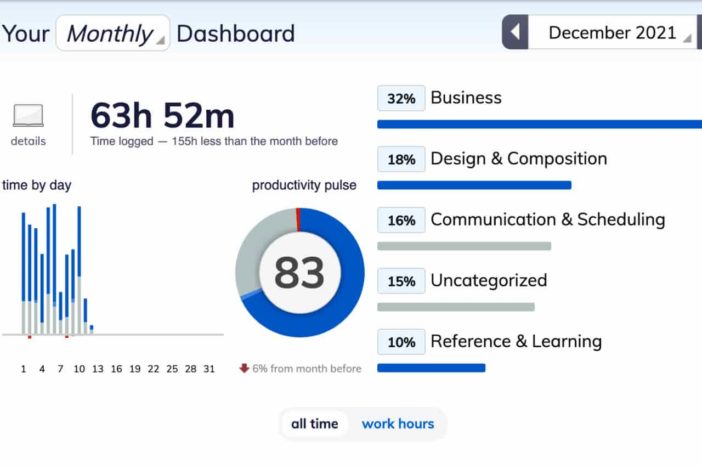
And here is the current screenshot showing that I have lowered communication and scheduling activities.
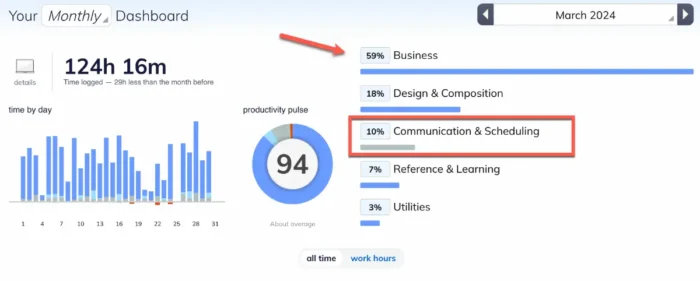
#11 Physiological Needs
Before starting work, finish all your physiological needs to eliminate the possibility that they will become a huge distraction when you work.
Don’t start work until you satisfy all your physiological needs. This way, you will not think about food or other nonwork-related requirements.
#12 Listen to inspirational music to eliminate distractions in form sounds.
Music can influence our mood, behavior, and creativity. Listening to uplifting, inspiring music is a great way to motivate yourself and focus on your goals.
When you’re trying to complete a task and easily distracted, listening to inspirational music can help you focus and complete your to-do list. Music can also effectively block environmental noise, such as ringing phones, coworkers talking, and people walking by.
So, if your workplace is where you have a large amount of distracting sound, you can turn on some inspirational music.
You can read more about how inspirational music can help you increase productivity, and this article has some great lists of music you can use for this purpose.
#13. Use noise-cancelling headphones to eliminate environmental noises.
Noise-cancelling headphones are an excellent option to reduce environmental noises and help you stay focused on your tasks.
Noise-cancelling headphones use advanced technology to cancel out background noises, allowing you to create a more productive working environment. They can also be useful for introverts who prefer a quieter environment to work in.
You can also use these headphones to listen to music or white noise, further reducing distractions and helping you stay on track with your work. Investing in a good pair of noise-cancelling headphones, and I personally recommend Bose Headphones 700, you can significantly improve your productivity and help you eliminate environmental noises that may distract you from completing your tasks.
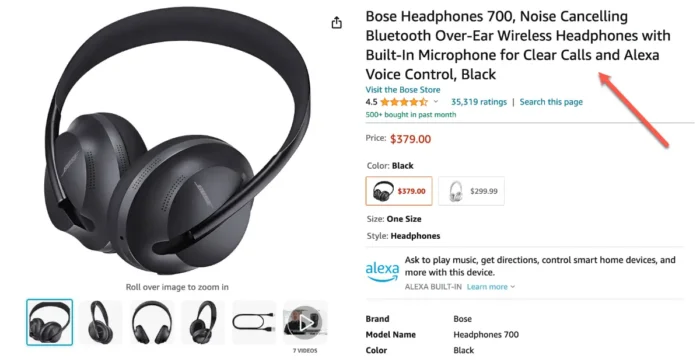
#14 Isolate Yourself to Eliminate Workplace Distractions Completly
If necessary, isolate yourself completely to eliminate all noise and distractions.
When working on a project, you need to eliminate distractions. You should have no conversations, incoming phone calls, or interruptions in your office. If you’re not allowed to have this, you should isolate as much as possible.
So, get up from your desk, remove any physical objects you might be seduced to look at, and enter another room.
If something is so important, you must isolate yourself. When I worked on my Ph.D. thesis, I decided to spend one week working only on the thesis. Because of that, I moved to a village without an internet connection. I was completely isolated there, and my only concern was working on my Ph.D. thesis.
Conclusion
As you can see, eliminating distractions is crucial if you want to maximize productivity and achieve success in your business or career. Implementing these steps can eliminate distractions and create a more focused working environment.

